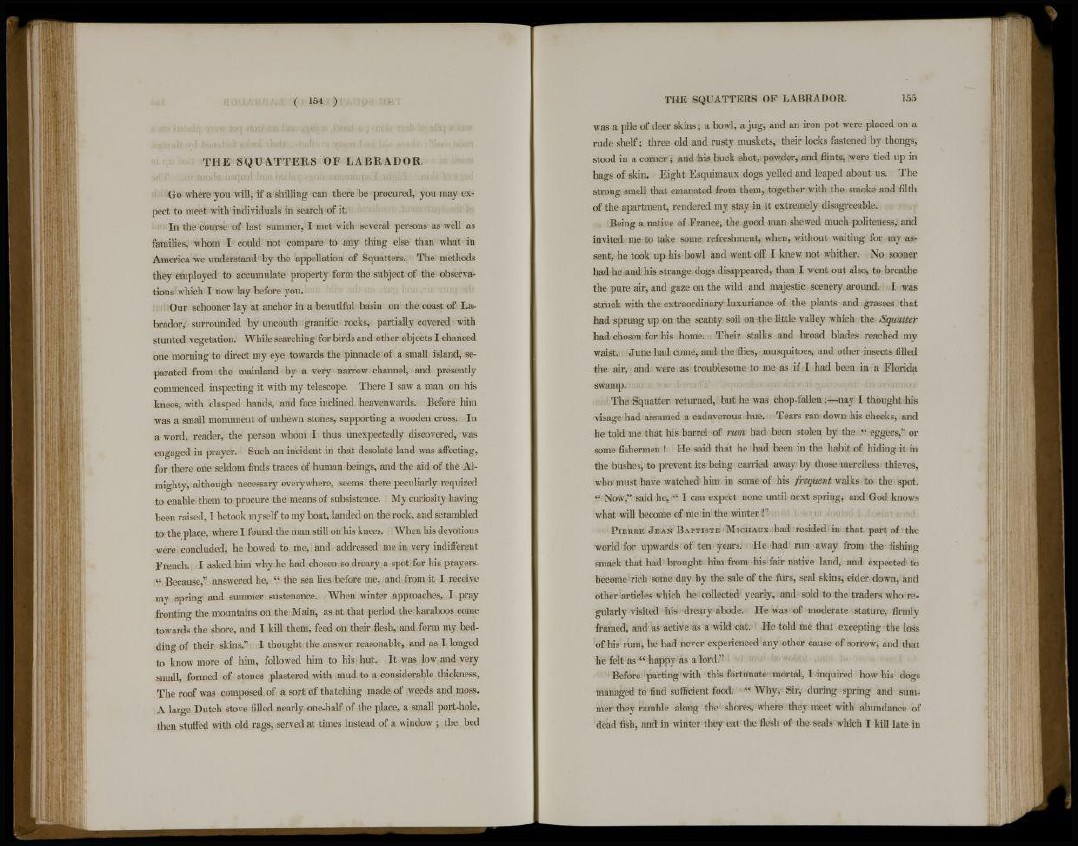
( 154 )
T H E SQUATTERS OF LABRADOR.
Go where you will, if a shilling can there be procured, you may expect
to meet with individuals in search of it.
In the course of last summer, I met with several persons as well as
families, whom I could not compare to any thing else than what in
America we understand by the appellation of Squatters. The methods
they employed to accumulate property form the subject of the observations
which I now lay before you.
Our schooner lay at anchor in a beautiful basin on the coast of Labrador,
surrounded by uncouth granitic rocks, partially covered with
stunted vegetation. While searching for birds and other objects I chanced
one morning to direct my eye towards the pinnacle of a small island, separated
from the mainland by a very narrow channel, and presently
commenced inspecting it with my telescope. There I saw a man on his
knees, with clasped hands, and face inclined heavenwards. Before him
was a small monument of unhewn stones, supporting a wooden cross. In
a word, reader, the person whom" I thus unexpectedly discovered, was
engaged in prayer. Such an incident in that desolate land was affecting,
for there one seldom finds traces of human beings, and the aid of the Almighty,
although necessary everywhere, seems there peculiarly required
to enable them to procure the means of subsistence. My curiosity having
been raised, I betook myself to my boat, landed on the rock, and scrambled
to the place, where I found the man still on his knees. When his devotions
were concluded, he bowed to me, and addressed me in very indifferent
French. I asked him why he had chosen so dreary a spot for his prayers.
" Because,1' answered he, " the sea lies before me, and from it I receive
my spring and summer sustenance. When winter approaches, I pray
fronting the mountains on the Main, as at that period the karaboos come
towards the shore, and I kill them, feed on their flesh, and form my bedding
of their skins.'" I thought the answer reasonable, and as I longed
to know more of him, followed him to his hut. It was low and very
small, formed of stones plastered with mud to a considerable thickness,
The roof was composed of a sort of thatching made of weeds and moss.
A large Dutch stove filled nearly one-half of the place, a small port-hole,
then stuffed with old rags, served at times instead of a window ; the bed
T H E S Q U A T T E R S O F L A B R A D O R . 155
was a pile of deer skins; a bowl, a jug, and an iron pot were placed on a
rude shelf; three old and rusty muskets, their locks fastened by thongs,
stood in a corner; and his buck shot, powder, and flints, were tied up in
bags of skin. Eight Esquimaux dogs yelled and leaped about us. The
strong smell that emanated from them, together with the smoke and filth
of the apartment, rendered my stay in it extremely disagreeable.
Being a native of France, the good man shewed much politeness, and
invited me to take some refreshment, when, without waiting for my assent,
he took up his bowl and went off I knew not whither. No sooner
had he and his strange dogs disappeared, than I went out also, to breathe
the pure air, and gaze on the wild and majestic scenery around. I was
struck with the extraordinary luxuriance of the plants and grasses that
had sprung up on the scanty soil on the little valley which the Squatter
had chosen for his home. Their stalks and broad blades reached my
waist. June had come, and the flies, musquitoes, and other insects filled
the air, and were as troublesome to me as if I had been in a Florida
swamp.
The Squatter returned, but he was chop-fallen;—nay I thought his
visage had assumed a cadaverous hue. Tears ran down his cheeks, and
he told me that his barrel of rum had been stolen by the " eggers,1' or
some fishermen ! He said that he had been in the habit of hiding it in
the bushes, to prevent its being carried away by those merciless thieves,
who must have watched him in some of his frequent walks to the spot.
" Now,1' said he, " I can expect none until next spring, and God knows
what will become of me in the winter V
PIERRE JEAN BAPTISTE MICHAUX had resided in that part of the
world for upwards of ten years. He had run away from the fishing
smack that had brought him from his fair native land, and expected to
become rich some day by the sale of the furs, seal skins, eider down, and
other articles which he collected yearly, and sold to the traders who regularly
visited his dreary abode. He was of moderate stature, firmly
framed, and as active as a wild cat. He told me that excepting the loss
of his rum, he had never experienced any other cause of sorrow, and that
he felt as " happy as a lord."
Before parting with this fortunate mortal, I inquired how his dogs
managed to find sufficient food. " Why, Sir, during spring and summer
they ramble along the shores, where they meet with abundance of
dead fish, and in winter they eat the flesh of the seals which I kill late in